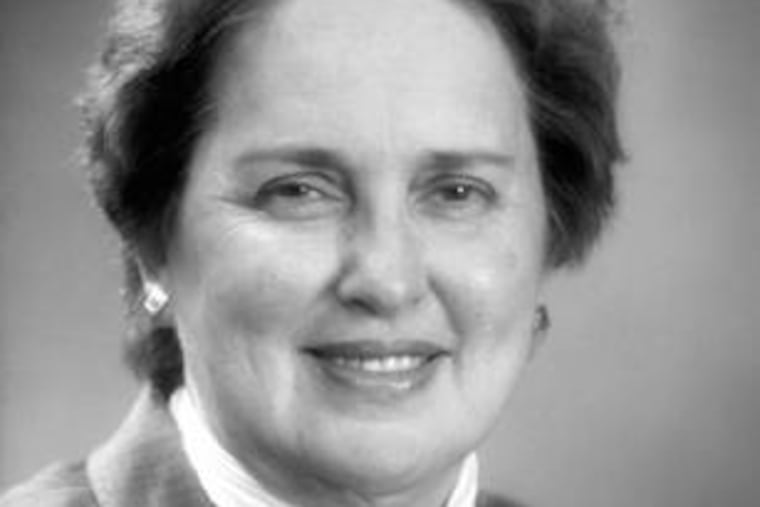Ethel Schwartz Weinberg, groundbreaking physician and administrator, dies at 83
Dr. Weinberg noticed that women were training as physicians, but leaving the field to raise families. She did something to help them.

Ethel Schwartz Weinberg, 83, of Philadelphia, a physician who received approval for the first internship in acute care medicine, laying the groundwork for the specialty of emergency medicine, died Wednesday, March 4, of melanoma at her home.
In 1970, Dr. Weinberg successfully appealed to the American Medical Association for the innovative internship program. The move grew from her belief that women physicians were at a disadvantage in the medical field because of their dual role as mothers.
She noticed that while many trained for the profession, some were leaving to raise children.
“I was struck that we needed some form of training that did not require the traditional working hours of a resident and where there were part-time jobs available,” she said in a biography on file at the National Library of Medicine. “It seemed that ‘acute care medicine’ in emergency rooms was a feasible idea.”
In 1968, she had joined the faculty at Woman's Medical College of Pennsylvania. Her duties included medical staffing issues. She envisioned and created the internship while directing its Retraining Program for Women Physicians. It was not an easy sell.
She met with the heads of the American Medical Association and the American Board of Medical Specialties in a Chicago hotel room. “They told me that there was no such thing as acute care medicine, but 'if it would keep the girls happy,’ they would approve it," she said in the biography.
At that time, hospitals were just starting to hire doctors specifically for emergency-room work. The internship program not only allowed women to get their foot in the ER door but also helped set the training standard for the new medical specialty.
“It shows that when she got involved, something grew,” said Dr. Jerry Escovitz, her friend and colleague as a medical educator. “At that time, 8% of doctors were women. She was a trailblazer, and she blazed a trail a lot more brightly than the average person.”
Dr. Weinberg went on to become a dean at Woman’s Medical, and that post led to more senior jobs in medical school and hospital administration.
In 1974, President Richard M. Nixon appointed her to the National Library of Medicine’s Board of Regents. In 1980, Dr. Weinberg was named senior associate dean at Temple University School of Medicine, and in 1986 she became vice president for academic affairs at Baystate Medical Center, a training hospital for the Tufts University School of Medicine. She was named dean at Baystate in 1988.
During her tenure there, she realized that there was a lack of appreciation for large, independent teaching hospitals within the field of medical education. In 1989, she formed the Alliance of Independent Medical Centers in Chicago to address the common interests of those hospitals. She was the first president of the alliance and remained its chair until 1994.
The nonprofit has 80 member hospitals and health systems across the nation, said executive director Kimberly Pierce-Boggs.
“Dr. Weinberg‘s vision, passion, and leadership changed the landscape in 1989, and 31 years later we are a strong and deeply respected voice in the academic medicine community,” Pierce-Boggs said. “She was a force of nature and will be deeply missed.”
In retirement starting in 1996, Dr. Weinberg relocated to Chapel Hill, N.C. Returning to Philadelphia in 2010, she began volunteering at the National Museum of American Jewish History and organized an internship program that places college students at Philadelphia museums and cultural institutions during the summer.
“Ethel was a visionary in the true sense of the word,” said her friend Judy Finkel, the academic liaison at the museum. “She looked at life as the way things were and then proceeded to change and improve them as she envisioned.”
Born in Wilmington, she graduated from Hahnemann Medical College in 1961 and served a residency in anesthesiology at Thomas Jefferson University Hospital from 1973 to 1975. Since her field was anesthesiology, not acute care, she didn’t get to enjoy the internship she had created.
She is survived by a son, David; a daughter, Diane; and four grandchildren. Her husband, Saul Weinberg, died in 2007. They were married for 48 years.
A memorial service will be at 9 a.m. Saturday, March 21, at the National Museum of American Jewish History, 101 S. Independence Mall East, Philadelphia. Interment is private.